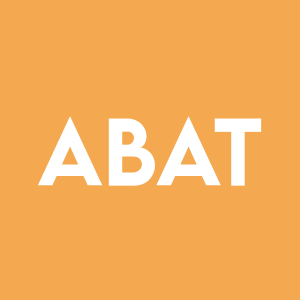American Battery Technology Company Joins U.S. Department of Energy and Industry Partners to Develop Future Battery and EV Workforce
Rhea-AI Summary
American Battery Technology Company (NASDAQ: ABAT) has joined the U.S. Department of Energy's Battery Workforce Challenge, introducing a new 'Design for Recyclability' category for a three-year collegiate and vocational engineering competition. The program involves twelve North American teams designing advanced lithium-ion battery packs for a 2024 Ram ProMaster EV.
ABTC will support students in developing battery packs with a focus on strategic disassembly and recycling, aiming to increase residual value and lower lifecycle costs. The challenge, sponsored by the DOE and Stellantis and managed by Argonne National Laboratory, includes partners like Samsung SDI America and the Volta Foundation. The initiative also aims to establish regional workforce training hubs for EV and battery manufacturing jobs.
Positive
- Partnership with DOE and major industry players strengthens ABTC's position in the EV battery ecosystem
- Access to next-generation battery technology and development through educational program
- Potential to influence future battery designs for improved recyclability and value retention
Negative
- None.
News Market Reaction
On the day this news was published, ABAT declined 9.44%, reflecting a notable negative market reaction.
Data tracked by StockTitan Argus on the day of publication.
- Public and private industry partners from each sector of the electric vehicle (EV) circular supply-chain chosen to establish real world environment to train and develop next generation battery and EV workforce.
- American Battery Technology Company (ABTC), representing battery recycling sector, to support the development of a new U.S. energy manufacturing workforce alongside public and private partners such as the U.S. Department of Energy, Argonne National Laboratory, Stellantis, Samsung SDI America, and the Volta Foundation.
- Top industry talent at ABTC supports future battery workforce to design battery packs for a Stellantis vehicle with more environmentally and economically sustainable materials and practices to build future talent capacity for the North American battery supply chain.
American Battery Technology Company (ABTC) (NASDAQ: ABAT), an integrated critical battery materials company that is commercializing its technologies for both primary battery minerals manufacturing and secondary minerals lithium-ion battery recycling, is pleased to announce its entrance into the U.S. Department of Energy’s Battery Workforce Challenge, and the launch of an ABTC developed new ‘Design for Recyclability’ category for this three-year collegiate and vocational engineering competition.
This competition supports twelve North American teams of universities and their regional vocational partners that are each designing, building, testing, and integrating a next-generation advanced lithium-ion battery pack and electric powertrain into a Stellantis donated 2024 Ram ProMaster EV. ABTC’s entrance into this competition brings an additional dimension of performance in the evaluation of these designs, as students are now challenged to design battery packs with a design for recyclability (DFR) mindset that allows for these complex batteries to be strategically disassembled and recycled at the end of their lives. These high-value constitute components within the batteries are then able to be recovered and resold into the domestic North American supply chain to create a closed-loop circular infrastructure, increasing the residual value of the battery pack and lowering overall lifecycle costs of EVs.
“We work directly with many of the premier automotive OEMs and receive large amounts of current and next generation prototype battery packs, and these pack designs are becoming increasingly complex with the proliferation of cell-to-pack, advanced passive propagation resistance, and hybrid cell chemistry designs,” stated American Battery Technology Company CEO Ryan Melsert.
Melsert continued, “When we speak with leadership at these automotive OEMs they often detail the engineering methods to increase gravimetric and volumetric energy density to increase performance and lower overall cost. However, one of the most impactful tools for decreasing cost is to increase the residual value of the battery at its end-of-life, and embedding from the early design stages a strategic plan for how to demanufacture a battery can significantly lower recycling costs and increase recovery rates within a recycling process.
This new “Design for Recyclability” methodology embeds within the next generation of electric vehicle and battery engineers the importance of designing battery systems that can be strategically demanufactured and recycled at their end of lives, and of using materials and designs to facilitate this closed-loop circular mindset to return end-of-life materials to the battery manufacturing supply chain. Training and guidance from ABTC will help steer new and innovative battery pack designs towards more environmentally and economically sustainable materials and practices.
The Battery Workforce Challenge is sponsored by the U.S. Department of Energy (DOE) and Stellantis and managed by Argonne National Laboratory. It provides future engineers and technicians real-life experiences to shape new energy efficient mobility solutions. The ‘Design for Recyclability’ category focuses on areas such as 3D modeling, dynamic simulations, and lifecycle modeling and economic impact, and it introduces students to Argonne National Laboratory ReCell’s BatPaC, GREET, and EverBatt Models, for calculating lifecycle greenhouse gas emissions, economic impacts, and ensuring that end-of-life materials are re-introduced into the domestic supply chain.
ABTC will also support other initiatives within the Battery Workforce Challenge Program, including efforts to establish regional workforce training hubs nationwide that will step into critical skill gaps and identify areas to reskill and upskill vocational and transitional workers for in-demand EV and battery manufacturing and recycling jobs.
For background about the Battery Workforce Challenge, please visit the U.S. DOE’s Advanced Vehicle Technology Competition Series, managed by Argonne National Laboratory.
About American Battery Technology Company
American Battery Technology Company (ABTC), headquartered in Reno, Nevada, has pioneered first-of-kind technologies to unlock domestically manufactured and recycled battery metals critically needed to help meet the significant demand from the electric vehicle, stationary storage, and consumer electronics industries. Committed to a circular supply chain for battery metals, ABTC works to continually innovate and master new battery metals technologies that power a global transition to electrification and the future of sustainable energy.
About Argonne National Laboratory
Argonne National Laboratory seeks solutions to pressing national problems in science and technology by conducting leading-edge basic and applied research in virtually every scientific discipline. Argonne is managed by UChicago Argonne, LLC for the U.S. Department of Energy’s Office of Science.
Forward-Looking Statements
This press release contains “forward-looking statements” within the meaning of the safe harbor provisions of the U.S. Private Securities Litigation Reform Act of 1995. All statements, other than statements of historical fact, are “forward-looking statements.” Although the Company’s management believes that such forward-looking statements are reasonable, it cannot guarantee that such expectations are, or will be, correct. These forward-looking statements involve a number of risks and uncertainties, which could cause the Company’s future results to differ materially from those anticipated. Potential risks and uncertainties include, among others, risks and uncertainties related to the Company’s ability to continue as a going concern; general economic conditions and conditions affecting the industries in which the Company operates; the uncertainty of regulatory requirements and approvals; fluctuating mineral and commodity prices, final investment approval and the ability to obtain necessary financing on acceptable terms or at all. Additional information regarding the factors that may cause actual results to differ materially from these forward-looking statements is available in the Company’s filings with the Securities and Exchange Commission, including the Annual Report on Form 10-K for the year ended June 30, 2024. The Company assumes no obligation to update any of the information contained or referenced in this press release.
Attachment








